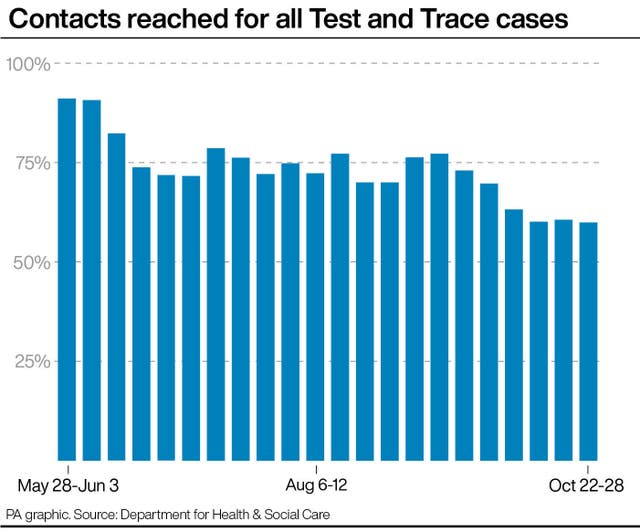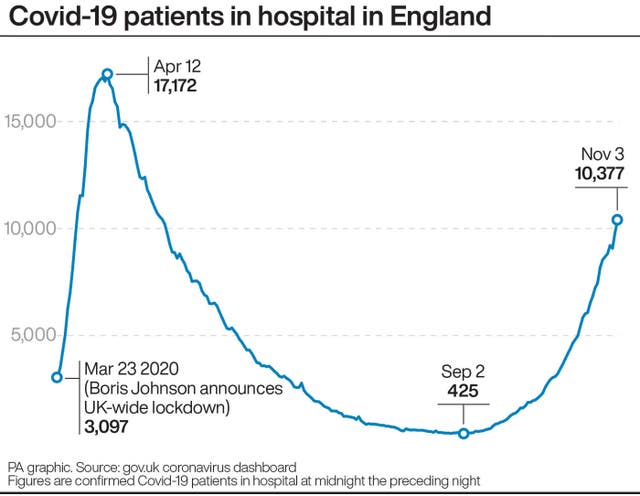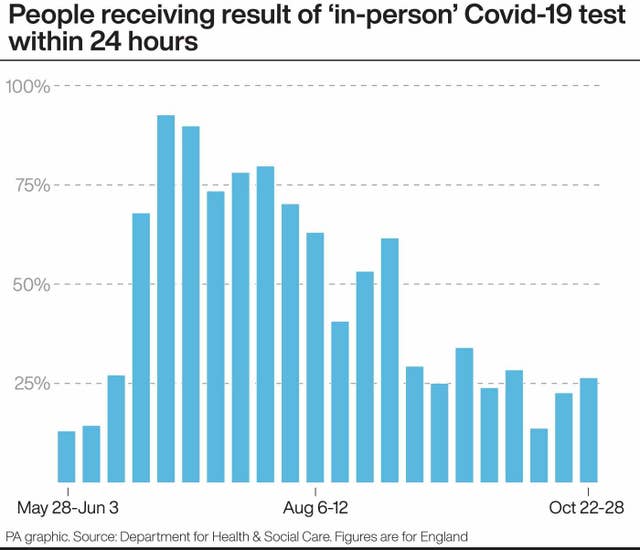NHS Test and Trace reaches lowest ever proportion of contacts
Four in 10 close contacts of people who tested positive are still not being reached by the system.

The NHS Test and Trace system has reached the lowest ever proportion of contacts of people who tested positive for Covid-19 in England.
Four in 10 close contacts of people who tested positive are still not being reached by the system, at the same time as it recorded its highest weekly number of positive cases.
A total of 137,180 people tested positive for Covid-19 in England at least once in the week to October 28 – an increase of 8% on the previous week and the highest weekly number since Test and Trace was launched at the end of May.

According to the latest figures, 59.9% of close contacts of people who tested positive in England were reached through the system in the week ending October 28.
This is the lowest since Test and Trace began and is down from 60.6% for the previous week.
For cases managed by local health protection teams, 97.9% of contacts were reached and asked to self-isolate in the week to October 28.
For cases managed online or by call centres, the figure was 58.5%.
Just 26.4% of people who were tested in England in the week ending October 28 at a regional site, local site or mobile testing unit – a so-called “in-person” test – received their result within 24 hours.
This is up from 22.6% in the previous week.

Prime Minister Boris Johnson had pledged that, by the end of June, the results of all in-person tests would be back within 24 hours.
He told the House of Commons on June 3 that he would get “all tests turned around within 24 hours by the end of June, except for difficulties with postal tests or insuperable problems like that”.
Of the 139,781 people transferred to the system in the week to October 28, 82.7% were reached and asked to provide details of recent close contacts – down slightly on 83.2% in the previous week.
Some 14.9% of people transferred to Test and Trace in the week to October 28 were not reached, while a further 2.3% did not provide any communication details.
Only 3.5% of people in England who used a home test kit for Covid-19 received their result within 24 hours in the week to October 28, the same percentage as the previous week.
Some 36.5% of people received the result of a home test within 48 hours, up from 24.9% in the previous week.

Before the new figures were published, Justice Secretary Robert Buckland said the month-long lockdown that began in England on Thursday will be used to “redouble our efforts” to expand the NHS Test and Trace programme.
Speaking to BBC Breakfast, he said it is also vital to increase the speed at which test results are returned.
“Lots of people are receiving them the next day which is good, but there are still too many people who are having to wait for days and we are going to continue to work to speed that up,” he said.
“We’ve got to use this time not only to deal with Test and Trace but also to prepare for when we get a vaccine.”
Miriam Deakin, director of policy and strategy at NHS Providers, said with the number of positive cases continuing to rise we face “a difficult period ahead”.
She added: “While it is encouraging to see that the number of people transferred to the contact tracing system this week has increased, we remain disappointed at the need to ‘play catch up’ as cases carried over from previous weeks are only now entering the system.
“The proportion of close contacts reached dropped below 60% this week which is also concerning.
“This means that over 131,000 close contacts were not reached and instructed to self-isolate in a timely manner.”
Ms Deakin welcomed the recent increase in national testing capacity, but pointed out that this week saw a drop of almost 50,000 people actually being tested across the country.
“While we remain more hopeful as we move towards a new national lockdown to reduce the spread of the virus, this is going to be an extremely difficult winter for the NHS and will place a further burden on staff who have worked relentlessly since the start of the pandemic to care for patients,” she said.
Ian Hudspeth, chairman of the Local Government Association’s community wellbeing board, said it is “hugely concerning” that the system is “going backwards” in the number of close contacts reached of those who have tested positive.
“If we are to prevent this second wave from escalating further, we need the system to meet the recommended 80% benchmark if it is to have any chance of success,” he said.
Interim executive chair of the National Institute for Health Protection, Baroness Dido Harding, said: “We know that there are areas where we still need to improve and we are working tirelessly to make the service quicker and more effective every day.”





